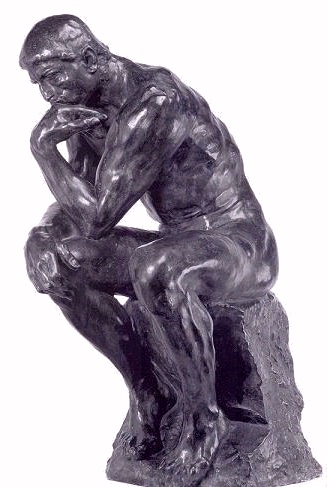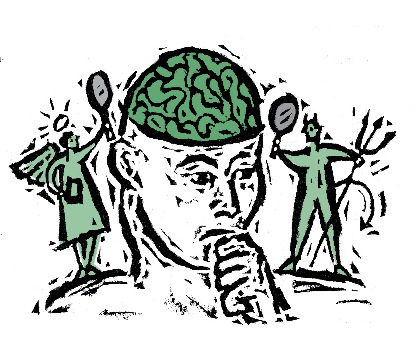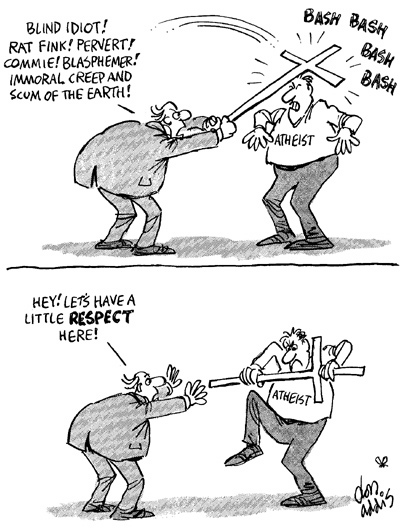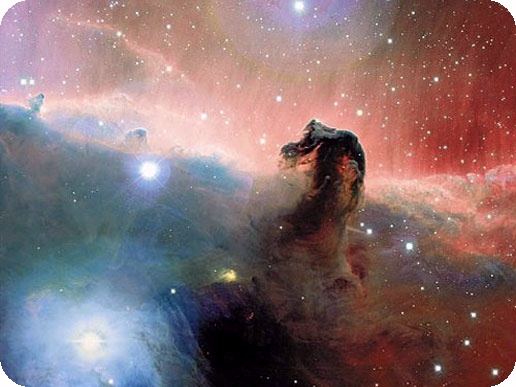|
|
|||||||||||||||||||||||||||||||
|
The Philosophy of Atheism
Atheism is the belief that gods, angels, devils, heaven, hell, nirvana and all supernatural things do not exist. As such atheism does not qualify as a religion, but rather is a philosophy with respect to life. The idea is relatively simple: Everything that is from mythology or religion is just an elaborate guessing game as to the nature of the universe, its origins and the supposed afterlife. Atheists also believe that it is immoral to force other people to follow a specific religion, to kill each other in the name of god and to pronounce judgement on people just because the Bible or Quran says so.
Life and DeathTo a non-atheist the idea of dying and ceasing to exist is sad and scary. People are comforted by the idea of an afterlife and some people even prefer the concept of hell over ceasing to exist. The concept of hell and punishment, or reincarnation as a cockroach, may also be comforting to some people who wish bad things on others. But how is that a good thing? If you spend your life wishing bad things to happen to other people that seems like a pretty miserable existence too. For atheists however there is no afterlife and they believe that people should live their lives to the fullest. Some atheists believe in the possibility of alternate universes, wherein you repeat your life's trials and mistakes and hopefully try to do better than you did last time. Regardless the idea is still life affirming and pushes the idea of living well and helping others around you to live well. Life and your time spent living is therefore precious to atheists. You only have one life so don't waste it worrying about death or thinking mean things. We all have regrets, but we should try to make the most of what life offers us.
"Trying to convert an atheist to a religion is like trying to turn water into wine. It isn't going to happen so don't waste your time." - Charles Moffat.
MoralityNone of us actually have miniature angels/devils on our shoulders telling us what to do. Our morality is determined by our decisions and our experience. If we rely on a book to tell us what to do, our sense of morality can sometimes lose touch with reality. Most atheists (and people in general) follow the Golden Rule: "Do unto others as you would have them do unto you." Atheism is not without morality and still believes in the simple principles of: Do not murder. Do not lie. Do not steal. Do not cheat. These are rules every human being can live by, and are rules commonly found in the major religions. Non-atheists, especially right wing Christians, have a tendency to cloud the issue of morality and claim that atheists don't have any morals. That would be incorrect. Morals are not forced upon us by religion. We learn morals from experience interacting with others. Many atheists hold reason, logic and empathy in high esteem, arguing that morality is meaningless if a person lacks reason and empathy for their fellow man. For example, the Bible doesn't say anything about abortion, but it does say "Thou shalt not kill." A Christian with a warped sense of morals could use that as justification to murder an abortionist or bomb an abortion clinic, and there have been numerous such attacks in the United States. Some Americans blame growing crime, rudeness and a growing lack of morality on atheism. However atheist/non-religious people makes up a very small percentage of the American population (less than 10%). If there is a loss of moral fibre in the United States it is not due to atheism, it is due to the lack of parental guidance in a society that has become too self-absorbed. Children these days are being taught to ignore the feelings of others in favour of their own immediate wants. Christians would be well-advised to take a page from their own book: “For the love of money is the root of all evil.” [Timothy 6:10] The Bible, and the Quran for that matter, does have some interesting rules about morality. Some of them good, but the Bible also endorses things like slave ownership, killing people who work on the Sabbath, stoning homosexuals/disobedient children to death and a variety of other ideas of questionable morality. [See various entries in Exodus and Leviticus.] Evidently one can't take everything the Bible says literally, it is 1500 years out of date and was written by 40 different individuals who couldn't agree on a name so they just called it "Book". Thus you understand why atheists don't take the Bible or any other religious material seriously. There is a moral disconnect in the Bible and many atheists know the moral ambiguities of the Bible very well, and because they can read it without the bias of faith they can point out its faults. Some people like to point out the good work some religious charities do, but ask yourself: Would you still be doing charity work even if your religion didn't tell you to do it? People do good things because they want to, not because a book said they should.
"With or without religion, you would have good people doing good things and evil people doing evil things. But for good people to do evil things, that takes religion."
Family and Holidays
Many atheists still celebrate Christmas (sometimes referred to as Xmas, Yuletide or even the Seinfeld inspired holiday "Festivus") and celebrate holidays like Halloween and Easter with their friends and family. Atheists agree that life should be celebrated and that time with family is precious. As such holidays are an excellent opportunity to spend time with friends and family. Some remove the ideas of Jesus Christ/Santa Claus, but depending on the family they allow their kids to learn later that Santa Claus doesn't really exist. As parents they take on the responsibility of letting their kids figure it out for themselves it was phony. Ostracizing family members because of their faith or lack of faith can be an issue for some families due to disagreements over the existence of god. The video above for example demonstrates a mother who is upset when her son announces he is has become an atheist and summarily decides to stop giving him Christmas presents as a form of punishment. The act in her case is desperate and immature and one would hope the family is reconciled and learns to live with their differences.
"Who says Atheists don't celebrate Christmas? Heck, even Buddhists and Jews give gifts around the Yuletide. People were celebrating the Yuletide long before Jesus was born or kicked the bucket." - Anonymous.
SecularismAtheists, agnostics and nonbelievers all agree on the concept of keeping religion and politics separate. Historically whenever religion interferes in politics the system collapses and/or war eventually breaks out. A notable example is the collapse of the Roman Empire. As such many people agree that religion should also be kept out of government departments, public schools and the military. People can still attend those schools, work for the government or military/etc., but they should not allow their religious beliefs to interfere with their duty to the government. Failure to do your duty because of your religious beliefs, or worse, deliberately doing something that either promotes your religious views or ridicules someone else's oversteps the boundaries and leads to corruption. Political corruption mixed with religion will only end in scandal and work to tarnish the name of both the religion and the government you represent.
"It does me no injury for my neighbor to say there are 20 gods, or no God. It neither picks my pocket nor breaks my leg." - Thomas Jefferson, U.S. President.
Science and FactSome atheists believe strongly in reason, logic, scientific facts and that science is always finding new facts and helping us to further understand the universe. As such many atheists also believe in Evolution, Gravity and that the universe expands through supernovas and contracts with black holes. Editor's Note: Believe may be the wrong word to use. Atheists do not 'believe' in science as facts do not require belief, but try convincing a Creationist that Evolution is real and you will quickly learn belief plays a strong role in their naysaying. Atheists also acknowledge the possibility of life on other planets and that the Earth is likely just one of many planets that contain intelligent life. There's no proof aliens do exist of course, but atheists try to keep an open mind on the subject since it would be a remarkable scientific discovery and shatter the belief that humans are the only sentient species.
An excellent example is Galileo who raised the idea that the earth rotates around the sun, as opposed to the Bible which states "the world is firmly established, it cannot be moved." Under threat of death the Catholic Church forced Galileo to recant his theory during the Roman Inquisition. It wasn't until 1992 that Pope John Paul II apologized and admitted the earth revolves around the sun, contrary to Pope Benedict XVI (formerly Cardinal Ratzinger) who still insists its the sun that moves and that the earth stay stationary. Atheists also reject the idea of superstitions like astrology, numerology, placebos, homeopathic healers, good/bad karma, praying, destiny and miracles. Such things atheists argue are basically just dumb luck. Stuff happens and people try to explain it as a miracle, but in reality there's always going to be a percentage of people that survive a tragedy. That isn't a miracle, its just a statistic. Humans we should note are not the only creatures who are superstitious, as demonstrated by American psychologist B. F. Skinner who discovered that pigeons and animals can also develop superstitious behaviour. In laboratory studies Skinner's pigeons adopted superstitious habits in an efforts to get foot pellets, the result of doing something when the food pellet had dropped. The end result was pigeons jumping about, pecking the corners and jerking their heads hoping that their behaviour would somehow cause another food pellet to drop.
"I cannot believe in the immortality of the soul.... No, all this talk of an existence for us, as individuals, beyond the grave is wrong. It is born of our tenacity of life – our desire to go on living … our dread of coming to an end." - Thomas Edison, American Inventor.
DiscriminationOne of the reasons many atheists don't like religions is because of the way religions tend to discriminate against others based on sex, sexuality, race, religion or ethnicity. However some atheists who have really strong opinions are just as guilty of discriminating too, sometimes mocking the fairy tale qualities of religions. This doesn't really serve anything however, all it does is prove is some people are assholes. It is recommended that atheists don't go out of their way to discourage people from worshipping gods, but rather to let people come to their own conclusions through rational thought. This doesn't mean however that atheists should be complete pushovers. Atheists should still stand up for their rights and freedom of speech/religion. Depending on the amount of religious fanaticism in a particular society coming out of the "closet" as an atheist could cause problems to a person's social life, their schooling and/or work because of religious discrimination. Some religious fanatics go out of their way to harass anyone who isn't of their faith.
“I contend we are both atheists, I just believe in one fewer god than you do. When you understand why you dismiss all the other possible gods, you will understand why I dismiss yours.”
PopulationApprox. 15% of the world's population is either atheist or non-religious (according to the CIA World Factbook 2007 and National Geographic 2000). According to an 1995 Encyclopædia Britannica poll the non-religious/atheists account for 18.5%. European countries have the highest ratio of nonbelievers (18% according to an EU survey). Sweden for example is 70% non-religious/atheist, Denmark 65%, Norway and the Czech Republic 60%, France 50% and Germany 45%.
Some Asian countries and Russia also have high rates of nonbelievers: Russia 35%, South Korea 30%, Vietnam 81%. Some countries like China have numbers like the world average: 15%. Some very religious countries, like the United States have non-religious/atheist populations of less than 10%. Polling people on their religion can sometimes be difficult. ie. In 2006 a New Zealand census asked "What is your religion?" and 34.7% responded no religion and 12.2% refused to answer the question. Some people simply prefer not to discuss their religious beliefs with the government or polling companies. Scientists are more likely to be nonbelievers too. Only 7% of the U.S. National Academy of Science believes in a personal god. The highly educated also have similarly high rates of nonbelief. Faith is statistically the most likely among the uneducated, which might be explained by the Christian sentiment: "The only book worth reading is the Bible."
"God is dead. God remains dead. And we have killed him. How shall we comfort ourselves, the murderers of all murderers? What was holiest and mightiest of all that the world has yet owned has bled to death under our knives: who will wipe this blood off us? What water is there for us to clean ourselves? What festivals of atonement, what sacred games shall we have to invent? Is not the greatness of this deed too great for us? Must we ourselves not become gods simply to appear worthy of it?"
Types of AtheismWeak or Implicit Atheism: You don't care that gods exist or don't exist and you're not worried about. When asked you refer to yourself as a Nonbeliever, Non-Religious or Indifferent. Strong or Explicit Atheism: You actively disbelieve in the existence of gods. When asked you refer to yourself as an Atheist. Humanism: You believe that all people have the ability to discern right from wrong through rational thought. Naturalism: You believe that "nature is all there is and all basic truths are truths of nature." Confucianism: You believe in the moral code and teachings of the Chinese philosopher Confucius, who believed gods do not exist, people should revere their parents/ancestors, treat people with respect and serve the state/mankind.
AgnosticismAgnosticism is a middle ground between belief and disbelief. Agnostics believe that gods can be neither proven or disproven. Strong Agnosticism refers the view that the question of the existence or nonexistence of God or gods and the nature of ultimate reality is unknowable by reason of our natural inability to verify any experience with anything but another subjective experience. A strong agnostic would say, "I don't know whether God exists or not, and neither do you." Weak Agnosticism is the view that the existence or nonexistence of any deity is currently unknown but is not necessarily unknowable, therefore one will withhold judgment until/if any evidence is available. A weak agnostic would say, "I don't know whether any deity exists or not, but maybe one day when there is more evidence we can find something out." Apathetic or Pragmatic Agnosticism is the view that there is no proof of either the existence or nonexistence of any deity, but since any deity that may exist appears unconcerned for the universe or the welfare of its inhabitants, the question is largely academic anyway. Agnostic Theism is the view of those who do not claim to know existence of any deity, but still believe in such an existence. (See Knowledge vs. Beliefs) Agnostic Atheism is the view of those who do not know of the existence or nonexistence of a deity, and do not believe in any. Ignosticism is the view that a coherent definition of God must be put forward before the question of the existence of God can be meaningfully discussed. If the chosen definition isn't coherent, the ignostic holds the noncognitivist view that the existence of God is meaningless or empirically untestable. A.J. Ayer, Theodore Drange, and other philosophers see both atheism and agnosticism as incompatible with ignosticism on the grounds that atheism and agnosticism accept "God exists" as a meaningful proposition which can be argued for or against. An ignostic cannot even say whether he/she is a theist or a nontheist until a better definition of theism is put forth.
"Religion is to Faith what Science Fiction is to Science: Fairy Tales and Wishful Thinking." - Charles Moffat.
|
|
||||||||||||||||||||||||||||||
|
Website Design + SEO by designSEO.ca ~ Owned + Edited by Suzanne MacNevin | |||||||||||||||||||||||||||||||






